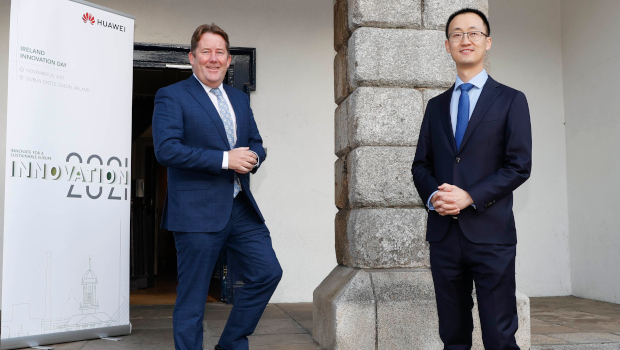
Digital technologies could deliver 40% of Ireland’s 2030 carbon reduction targets
Successfully deploying digital technologies could deliver up to 40% of the reduction in carbon emissions needed to meet Ireland’s 2030 targets, according to a new study by Amárach Research.
The report suggests effective implementation of a digitally sustainable programme of transformation – through digital solutions in energy, manufacturing, agriculture, buildings and transportation – has the potential to reduce emissions as part of meeting the targets set out by the Climate Action Plan 2021.
Using Digital Europe figures for digital’s potential role in CO2 emission reductions, Amárach Research calculated that digitalisation could deliver 9.9-13.1 MtCO2eq. in emission reductions towards Ireland’s 2030 target.
The new research has also found that 52% of senior decision-makers across the energy, agri-food and public sectors now see climate change as the most important business consideration – ahead even of labour/skills shortages – while 92% of leaders surveyed expect sustainable business operations to be important in saving money, driving overheads down and reducing costs.
The new Amárach report, ‘Ireland’s Digital Path to Sustainability’, was commissioned by Huawei Ireland and launched today by Minister for Housing, Local Government & Heritage Darragh O’Brien, at a virtual event based in Dublin Castle to mark Huawei European Innovation Day 2021.
The research found that 49% of Irish organisations think digital technologies will play an important role in achieving their sustainability goals over the next three years, with 43% also saying sustainability now aligns with their organisation’s values and aims.
Companies are now overwhelmingly seeing carbon reduction as fundamental to their business operations, according to the report, but with SMEs tending to be further behind on their journey towards sustainable business operations relative to larger firms.
When asked which technologies will be most important for their organisation’s sustainability objectives over the next three years, respondents had diverging views as to which technologies would be most relevant, with 5G, cloud, Internet of things (IoT), machine learning, artificial intelligence (AI) and virtual reality (VR) all cited.
“Everything runs on energy, and to make our solutions sustainable, we need to innovate,” said Minister O’Brien. “A significant amount of carbon emissions occur during the manufacturing and construction process, but innovation can play a key role to mitigate this, and is already doing so. Industry 4.0 is making building and manufacturing processes more energy efficient.
“The European Environment Information and Observation Network also pinpointed the role for the digital sector in contributing to the European Green Deal and reducing the manufacturing sector’s environmental impact in a report earlier this year. I would like to thank Huawei and Dublin Chamber for their efforts in hosting this significant event today in this respect and I applaud this insightful thought-provoking new Amárach report, which will be an extremely valuable tool for policy-makers and innovators in reducing our carbon emissions.”
“With Ireland already performing very well at integrating digital technology into the economy, and ranked fifth of the 27 EU countries in the 2021 edition of the Digital Economy and Society Index, we believe that Ireland has a great opportunity to accelerate the transition to clean energy and sustainable growth,” said Tony Yangxu, chief executive officer, Huawei Ireland.
“This new research carried out by Amárach gives valuable insight into the evolving and increasingly prominent sustainability objectives of organisations and companies across Ireland. It is clear innovative digital technologies will play a central role in tackling climate change, but it is only by working together that we can find and deploy the critical government, industry and society-wide digital solutions required for Ireland to meet its Climate Action Plan 2021 goals.”
Speaking on the launch of the report Mary Rose Burke, Chief Executive Officer, Dublin Chamber, said: “Dublin Chamber welcomes the launch of this report by Amárach and Huawei. The findings demonstrate that digital technologies will play a crucial role in achieving sustainability goals and reducing carbon emissions.
“We in Dublin Chamber see Irish companies responding to climate change in many cases ahead of what national government is doing. They are following the customer, following their staff, and following the investor in terms of their demands on business to be green. In order to meet these demands, it is clear from this report that digital solutions are the way forward.”
The Dublin Castle event also featured contributions on female leadership involving Lord Mayor of Dublin, Alison Gilliland; Siobhan O’Shea, Client Services Director, CPL; Brid Horan, Chancellor, DCU and Paul Harrison, Huawei UK. The STEM Education & Talents Upskilling session heard from Sarah Jane Delaney, Professor of Inclusive Computer Science, TU Dublin; Dr Brendan Jennings, Vice President for Research and Innovation, TU Dublin; Dr Lisa Higgins, Head of Challenge Research, Science Foundation Ireland and Conor McGinn, CEO, Akara Robotics.
Additionally, there were contributions from TECH4HER alumni, and an announcement of new scholarship opportunities for female STEM students as part of the Huawei ‘TECH4HER’ Scholarship Programme, with UCC now joining TU Dublin and UCD as universities taking part in the initiative.
TechCentral Reporters





Subscribers 0
Fans 0
Followers 0
Followers